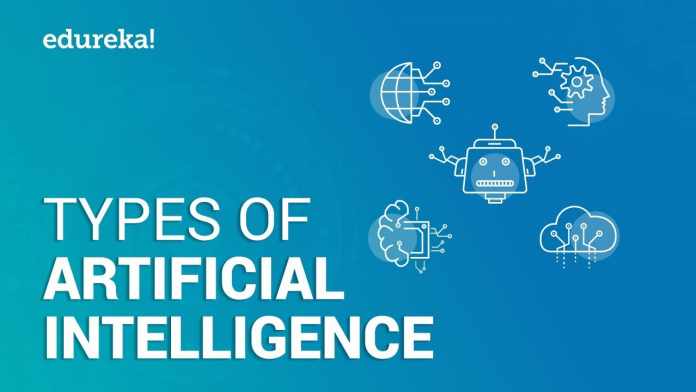Intro of Types of Artificial Intelligence
We are on a high-end spectrum of mind-blowing devices with constant technological innovation. This leaves us with continual amazement. We have different software and tools to do a variety of activities. These may range from doing household works to car driving in the most terrible war zone. But do we know how they operate? It is mostly done by Types of Artificial Intelligence.
Do you want to know to gain a brief idea about AI and its typologies? If yes, I would say you are definitely in the right place! This article on Types of Artificial Intelligence will help you understand the different types of artificial intelligence in a very comprehensive but precise way. So, let’s jump into the article.
-
What is Types of Artificial Intelligence?
Artificial intelligence (AI) is a branch of computer science. This brunch concerns with building machines. Usually, the device needs human intelligence. However, these machines do not need any human assistance. It can perform a task just like a human.
AI is unique additions to modern technology. This technology brings the 21st century to another level. However, John McCarthy invented the term “Artificial intelligence.” It was in 1956 when he defined AI. He called it: ‘The science and engineering of making intelligent machines.’
What is the prospect of AI? Technologists answered this. Applying AI in many fields is increasing. This will rise by 50% between 2040 and 2050. Moreover, this figure will be 90% by 2075.
Features of AI:
- Facial Recognition
- Data Ingestion
- Chat Bots
- Quantum Computing
- Cloud Computing
- Automate Simple and Repetitive Tasks
- Types of Artificial Intelligence (AI)
The type of AI depends on human capabilities. Therefore, AI is classified into multiple classes.
- Types of Artificial Intelligence-based on Functionality:
There are four types of artificial intelligence based on this type. These types of AI are mainly based on their specific functions.
1. Reactive Machines
This type of AI is known as one of the oldest types. This comes with limited ability. This machine does not have memory power. As a result, it cannot work with previous data. It has made them unable to “learn.”
This type of AI involves the computer understanding of the world directly. They act on what it sees. It does not depend on an internal concept of the world. As a result, they can’t function beyond the specific tasks. Because technologies have no concept of the wider world.
This type of AI follows a human’s capability to act to various kinds of incentives. So, they react to different types of performance that are executed in front of them. However, these machines can only be used for manually responding to a limited set.
Example
One of this type of AI is IBM’s Deep Blue. This machine can play chess. Deep blue played a match with Grandmaster. He won the match. It can predict the next move.
This machine competed with the chess Grandmaster Garry in 1997. It was a war between human vs robot. In that match, Deep Blue by IBM won the match. This AI system could predict the next possible moves for it and its opponent. As a result, it was able to choose the most optimal moves for itself among various possibilities.
2. Limited Memory
Limited Memory AI can make decisions. They can do this by studying the previous data. Such type of AI store past experiences. The memory helps them to value future actions.
These machines are also capable of learning from historical data. There are large volumes of data stored in their memory. This memory helps them to form a reference model. Also, these models help the machine to solve future problems. Almost all existing applications will come under this type of AI.
Example:
For instance, let’s imagine an image recognition AI. This machine can store pictures with names and other objects. Such type of AI detects new data. It uses previous data. Therefore, it labels new images based on its “previous learning experience”.
Another example is self-driving cars. They collect recent data. They use these for making decisions. For example, self-driving cars use sensors to identify humans crossing the road, traffic signals. These sensors help them to make better driving decisions. This helps to prevent any future accidents. Apple’s Siri also uses this type of AI.
3. Theory of Mind
You will find the last two AI types in abundance. Theory of mind AI is the next-generation AI system. Researchers nowadays trying to innovate such a type of AI.
Philosophers and psychologists firstly used the term “Theory of mind”. They used this term for the machine’s ability to predict the actions of self and others. In this way, these machines would be able to understand the entities by discerning their thought processes. Therefore, they will be able to analyze data. They will also be capable of using their common sense in interpreting data. These features will help them to take real-time decisions.
Artificial intelligence is already a promising industry. Also, AI comes with a core of heed for researchers. Hence, achieving this type of AI needs more development in the future. Because these bits of intelligence will surely perceive as the human’s needs as individuals. But it is a fact that multiple factors are working there.
4. Self-Awareness
Self-awareness AI can interpret human emotions. They are capable of taking decisions. These decisions are logical and emotional as well. This type of AI can understand and evoke emotions. Besides, they also have emotions, desires of their own. Therefore, they will be akin to the human brain. Sounds exciting right?
Self-awareness AI can beef-up overall progress. But it has also the ability to lead us potentially to catastrophe. Therefore, technologists are wary of this type of AI. Because such type of AI would be able to have self-preservation ideas. These ideas may threaten humanity. As they would be smarter than us.
However, these AIs exist only theoretically. Still, we have a long way to go to create this type of AI. But it is obvious that the ultimate goal of all AI research is and will be to make this type of AI.
Currently, this is not a developed idea. Researchers are continually trying to expand this field and work upon it.
-
Types of Artificial Intelligence-Based on Capability
As the name suggests, this type of Artificial Intelligence has one solid ground of skills. But they have vast functions. However, the AI types are divided into three classes, which may include:
1. Artificial Narrow Intelligence
Artificial narrow intelligence refers to a type of AI system that can only perform a specific task. They do it independently by using human-like capabilities. Another synonym for Narrow AI is ‘Weak AI.’ However, that doesn’t mean that AI is inefficient or something like that. They can do nothing more than what they are programmed to do. Therefore, they have a very narrow range of competencies.
Artificial Narrow Intelligence highly corresponds to all the reactive and limited memory AI. However, each weak AI contributes to the building of strong AI. Even the most complex AI uses machine learning and deep learning to teach itself. They all will fall under ANI.
Example Types of Artificial Intelligence
Virtual assistants such as Amazon’s Alexa and Apple’s Siri operate through this type of artificial intelligence.
Another example of it is a poker game. In this game, a machine beats humans. The device controls the game based on the given input.
2. Artificial General Intelligence (AGI)
This type of AI is the ability of an AI agent to learn, understand, and function entirely as a human being. AGI does not still exist. Humans are very keen on this AI. Although science-fiction stories have been featuring AGI technology for more than a century. Now, it is becoming more popularized in modern times by films. For instance: Science fiction movie: A Space Odyssey (2001), Ex Machina (2014).
This AI mainly represents the generalized human intelligence in software. So, the AI system can find a solution. These AI will act like a human. Such a type of AI will be capable of understanding the world, just like any human being.
Moreover, they will be capable of learning to carry out a massive range of tasks. They will build multiple competencies on their own. For instance: form connections and generalizations across domains. As a result, less time will be needed to train them up. Several experts are wary of this feature of AGI. This feature is giving a hidden threat to the existence of humanity.
3. Artificial Super Intelligence (ASI)
The development of such type of artificial intelligence will probably mark the peak of AI research. AGI will become the most capable form of intelligence on earth. This type of AI has more significant memory, faster data processing.
On the other hand, this system has some wrong sides. One of the downsides of ASI is that it can cause an uncontrollable change. This change can forever reshape our human civilization. Maybe, that change is positive. But there is also the risk of causing a valuable loss to our lives as well.
-
Final verdict:
We cannot deny the power of Artificial Intelligence in our lives. Our extensive use of different types of AI proves its usefulness in our lives. We now use Artificial Intelligence in other activities. For instance: in mobile apps, online searching, and for many purposes.
We are all equal participants in shaping our life. However, the question remains about how useful this technology. It will be for the greater good in the future. Will there come a time when we would regret it? As we are now allowing them to surpass humans in every way possible.
- Types of Artificial Intelligence FAQs
1. What is AI with an example?
Artificial Intelligence (AI) is the branch of computer sciences. AI works on the development of intelligent machines and systems. So that they can think and work like humans. Examples of AI include speech recognition, problem-solving, learning, etc.
2. What are the Types of AI?
There are different types of Artificial Intelligence-based on many standards. The main two are capability and functionality. AI has three kinds on the criteria of power. These include Artificial Narrow Intelligence, Artificial General Intelligence, and Artificial Super Intelligence. There are four types of AI-based on functionality. They are Reactive Machines, Limited Memory, Theory of Mind, and Self-awareness.
3. How do we use AI in everyday life?
Every day we are using AI by knowing or not knowing. Different types of AI operate other programs and services. They help us to do daily tasks. For example: connecting with friends, using an email program, etc. Therefore, it feels great to know that most of us have been using AI regularly for many years.
If we go through just with an example, it will be clear. We use a Smartphone. Some features like GPS. These weather apps, direction. Also, many more are running with AI.
-
Meta
Artificial intelligence is the most complex addition in the technological field. In this 21st century, we are using different types of AI. These machines not only help us to ease. So, our life but also makes the most modern one. There are different types of Artificial Intelligence-based on their functions and capabilities. So, there are mainly three types of AI-based on ability. On the other hand. We will find four types of AI-based on functionality. In the article “Types of Artificial Intelligence,” I have discussed different AI types in a very comprehensive but precise way.










